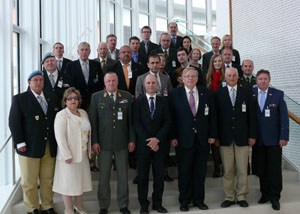 VIENNA, 27 May (UN Information Service) - "Conflict is costly - seemingly expensive peacekeeping operations are much cheaper," Julian Harston, a former UN Assistant Secretary-General said in his keynote address to an audience of peacekeepers, civil society representatives and government officials convened at the United Nations headquarters in Vienna on 27 May at the third
Networking for Peace forum.
VIENNA, 27 May (UN Information Service) - "Conflict is costly - seemingly expensive peacekeeping operations are much cheaper," Julian Harston, a former UN Assistant Secretary-General said in his keynote address to an audience of peacekeepers, civil society representatives and government officials convened at the United Nations headquarters in Vienna on 27 May at the third
Networking for Peace forum.
Hosted by the United Nations Information Service (UNIS) Vienna in cooperation with the Association of Austrian Peacekeepers (AAP), the Austrian Ministry of Defence and Sports and the City of Vienna, the meeting was organized in late May to coincide with the 8 th observance of the International Day of UN Peacekeepers. The Networking for Peace forum provides a platform for participants and peacekeeper associations to share experiences and ideas for regional cooperation in peacekeeping.
As the Forum also marked the observance of the International Day of UN Peacekeepers, UNIS Director Maher Nasser requested participants to stand up for a minute of silence to honour the sacrifices of men and women who lost their lives while serving under the UN flag, following his welcome remarks. In his remarks, Gen. (retd.) Günther Greindl, spoke about the value of having associations of peacekeepers and networking with each other and with other segments of the society. These were important in establishing better public understanding of peacekeeping and peacekeeping goals and objectives which would encourage increased support and participation in peacekeeping, he said.
In providing an overview of the current state of UN peacekeeping, Mr. Harston pointed out six key challenges that every mission needs to address: to restore security and stability in the mission country, to ensure a legitimate political framework, to revitalize the economy, to support national reconciliation, to bring civil society back together and to take into account the regional context. Given these enormous tasks, peacekeeping has become an increasingly complex endeavour. In order for missions to succeed, Member States need to provide sufficient resources, Mr. Harston elaborated from his longstanding experience and requested to keep mission mandates in line with the support the international community is willing to provide: "Without proper support, peacekeeping is being pushed to the wall: it will be overburdened and under funded at the same time".
Associations of peacekeepers, as convened at the conference today, can help generate the support needed by making the benefits of peacekeeping known and thus increase public support in their respective home countries. Participants at the forum from Austria, Croatia, Czech Republic, Hungary, Poland, Romania, Serbia and Slovakia, took the opportunity to discuss the respective contributions of their countries to international peace efforts and the lessons learnt from mission participation.
Lt. General Günther Höfler, Commander of the Austrian Defence Forces, presented the concept of Protection of Civilians in Armed Conflict in the context of Security Council resolution 1894 (2009) which was sponsored by Austria in the UN Security Council. "The decisive part is the implementation in the field. All stakeholders need to be involved in a comprehensive approach", stressed Lt. General Höfler. Austrian forces participated in the recent UN-mission to Chad and the Central African Republic (MINURCAT) where protection of refugees and internally displaced persons was part of the mission mandate. It was commonly agreed that cooperation between the actors on the ground is vital, not only between military and civilians but also between troop contributors.
Following an extensive exchange of experience and examples of the work of various associations of peacekeepers or similar bodies by participants, there was wide agreement to build on the suggestion by UNIS Director Maher Nasser to set up an internet-based platform for networking and regular updates. UNIS Vienna demonstrated the practicality and ease with which such a platform could be established using existing websites such as Facebook. "This can be a virtual meeting point for continuous networking," Mr. Nasser explained.